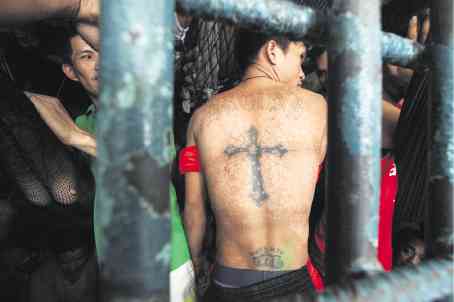
A CROSS is tattooed on the back of a drug suspect in a Davao City jail, a testament perhaps to his belief in God, which PNP Chief Ronald “Bato” dela Rosa, in a speech before Mimaropa policemen, said is key to the war on drugs. KARLOS MANLUPIG/INQUIRER MINDANAO
CITY OF CALAPAN—Amid expressions of concern by Catholic Church leaders over the growing list of victims of summary killings linked to the war on drugs, Philippine National Police Chief, Director General Ronald “Bato” dela Rosa, gave policemen here a pep talk about God being on their side in the campaign to wipe out the drug menace.
“Don’t be afraid to die, God is with us,” Dela Rosa said at a visit to policemen in the Mimaropa (Mindoro, Marinduque, Romblon and Palawan) region at Camp Efigenio C. Navarro here recently.
The 54-year-old police chief, mindful of policemen in their formation under the heat of the sun, kept asking them “Still all right?”
Injecting humor into his speech as he usually does, Dela Rosa said in jest that policemen with bald heads like him should keep watch for drug suspects running after them, much like jealous wives would.
But he turned serious when he talked about his commitment to his job, which he said, like President Duterte, he did not ask for but one that “God and the public gave.”
Popularity
“We’re gaining back the (good) image of the police,” said Dela Rosa. “I feel that as I get several requests for selfies, even when I am drooling in the airplane, even though I am ugly,” he said, eliciting laughter from the audience.
“Some would just embrace me, say thank you,” he added.
While he reported a decrease in crime volume, he expressed sadness that some policemen are getting killed.
He said if he loses the battle against drugs, which the Duterte administration wants to be successful in six months, he is willing to be removed from office.
“But if you like me, you will help me. But before I am relieved, you will be first relieved,” he said, warning policemen involved in drugs. “I will never tolerate coddling of drug personalities,” he said.
He said a policeman’s salary is already sufficient for them to resist the temptation of involvement in crime.
Dela Rosa also led the launching of the Mimaropa police’s antidrug project called Drogamon Go, derived from the highly popular internet game Pokemon Go.
The project was launched in the presence of at least 500 drug suspects who surrendered to the regional police.
The project seeks to encourage the transformation of addicts and pushers into antidrug advocates.
It is being enforced together with members of Barangay Anti-Drug Abuse Councils (Badac) and by police stations in the region.
Drogamon Go would require the profiling of drug suspects for livelihood or educational programs.
Under the project, members of Drogamon Go teams, which would be composed of former addicts and pushers and with supervision from police officers, would be trained as public speakers against drugs.
They would deliver speeches about the evils of drugs in schools, youth gatherings and in Oplan Tokhang events in villages.
“I hope no more among you will die,” Dela Rosa told the audience of users and pushers who surrendered to the Mimaropa police.
Turning religious, Dela Rosa told the users and pushers to turn to God. People resort to drugs, he said, because of “emptiness in the heart.” No rehabilitation program, he said, would succeed in reforming addicts if God is not involved.
“Nobody is more powerful than God,” he said.